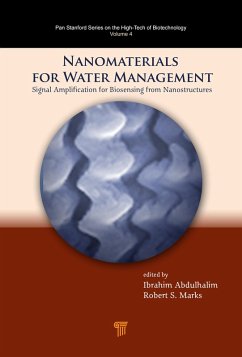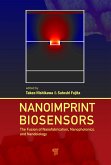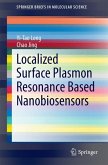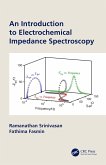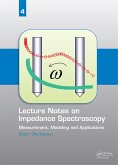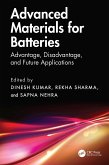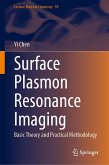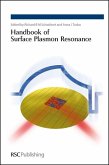Nanomaterials for Water Management (eBook, PDF)
Signal Amplification for Biosensing from Nanostructures
Redaktion: Marks, Robert S.; Abdulhalim, Ibrahim
100,95 €
100,95 €
inkl. MwSt.
Sofort per Download lieferbar

50 °P sammeln
100,95 €
Als Download kaufen

100,95 €
inkl. MwSt.
Sofort per Download lieferbar

50 °P sammeln
Jetzt verschenken
Alle Infos zum eBook verschenken
100,95 €
inkl. MwSt.
Sofort per Download lieferbar
Alle Infos zum eBook verschenken

50 °P sammeln
Nanomaterials for Water Management (eBook, PDF)
Signal Amplification for Biosensing from Nanostructures
Redaktion: Marks, Robert S.; Abdulhalim, Ibrahim
- Format: PDF
- Merkliste
- Auf die Merkliste
- Bewerten Bewerten
- Teilen
- Produkt teilen
- Produkterinnerung
- Produkterinnerung

Bitte loggen Sie sich zunächst in Ihr Kundenkonto ein oder registrieren Sie sich bei
bücher.de, um das eBook-Abo tolino select nutzen zu können.
Hier können Sie sich einloggen
Hier können Sie sich einloggen
Sie sind bereits eingeloggt. Klicken Sie auf 2. tolino select Abo, um fortzufahren.

Bitte loggen Sie sich zunächst in Ihr Kundenkonto ein oder registrieren Sie sich bei bücher.de, um das eBook-Abo tolino select nutzen zu können.
The interest in finding reliable and highly sensitive sensors for water quality control has grown recently empowered by the explosion of cutting-edge technologies such as nanotechnologies, optoelectronics, and computing on one hand and by the increasing need for more secure control of water quality on the other hand. This book highlights a number o
- Geräte: PC
- mit Kopierschutz
- eBook Hilfe
- Größe: 20.77MB
Andere Kunden interessierten sich auch für
![Nanoimprint Biosensors (eBook, PDF) Nanoimprint Biosensors (eBook, PDF)]() Nanoimprint Biosensors (eBook, PDF)100,95 €
Nanoimprint Biosensors (eBook, PDF)100,95 €![Localized Surface Plasmon Resonance Based Nanobiosensors (eBook, PDF) Localized Surface Plasmon Resonance Based Nanobiosensors (eBook, PDF)]() Yi-Tao LongLocalized Surface Plasmon Resonance Based Nanobiosensors (eBook, PDF)40,95 €
Yi-Tao LongLocalized Surface Plasmon Resonance Based Nanobiosensors (eBook, PDF)40,95 €![An Introduction to Electrochemical Impedance Spectroscopy (eBook, PDF) An Introduction to Electrochemical Impedance Spectroscopy (eBook, PDF)]() Ramanathan SrinivasanAn Introduction to Electrochemical Impedance Spectroscopy (eBook, PDF)48,95 €
Ramanathan SrinivasanAn Introduction to Electrochemical Impedance Spectroscopy (eBook, PDF)48,95 €![Lecture Notes on Impedance Spectroscopy (eBook, PDF) Lecture Notes on Impedance Spectroscopy (eBook, PDF)]() Lecture Notes on Impedance Spectroscopy (eBook, PDF)52,95 €
Lecture Notes on Impedance Spectroscopy (eBook, PDF)52,95 €![Advanced Materials for Batteries (eBook, PDF) Advanced Materials for Batteries (eBook, PDF)]() Advanced Materials for Batteries (eBook, PDF)51,95 €
Advanced Materials for Batteries (eBook, PDF)51,95 €![Surface Plasmon Resonance Imaging (eBook, PDF) Surface Plasmon Resonance Imaging (eBook, PDF)]() Yi ChenSurface Plasmon Resonance Imaging (eBook, PDF)129,95 €
Yi ChenSurface Plasmon Resonance Imaging (eBook, PDF)129,95 €![Handbook of Surface Plasmon Resonance (eBook, PDF) Handbook of Surface Plasmon Resonance (eBook, PDF)]() Handbook of Surface Plasmon Resonance (eBook, PDF)169,95 €
Handbook of Surface Plasmon Resonance (eBook, PDF)169,95 €-
-
-
The interest in finding reliable and highly sensitive sensors for water quality control has grown recently empowered by the explosion of cutting-edge technologies such as nanotechnologies, optoelectronics, and computing on one hand and by the increasing need for more secure control of water quality on the other hand. This book highlights a number o
Dieser Download kann aus rechtlichen Gründen nur mit Rechnungsadresse in A, B, BG, CY, CZ, D, DK, EW, E, FIN, F, GR, HR, H, IRL, I, LT, L, LR, M, NL, PL, P, R, S, SLO, SK ausgeliefert werden.
Produktdetails
- Produktdetails
- Verlag: Taylor & Francis
- Seitenzahl: 238
- Erscheinungstermin: 3. August 2015
- Englisch
- ISBN-13: 9789814463485
- Artikelnr.: 43417168
- Verlag: Taylor & Francis
- Seitenzahl: 238
- Erscheinungstermin: 3. August 2015
- Englisch
- ISBN-13: 9789814463485
- Artikelnr.: 43417168
- Herstellerkennzeichnung Die Herstellerinformationen sind derzeit nicht verfügbar.
Ibrahim Abdulhalim is a professor in the Department of Electrooptic Engineering at Ben Gurion University. He has worked in research and development in a variety of academic institutions and industrial companies. From August 1988 till May 1991, he was a research associate within the Optoelectronic Computing Systems Center in the University of Colorado at Boulder, USA where he worked on ferroelectric liquid crystal spatial light modulators. During July 1991 till July 1993 he was a research fellow in the Optoelectronics Research Center of Southampton University, England, working on fiber acousto-optic modulators for Q-switching and Mode-locking of fiber lasers. During 2000-2001 he was with the Thin Films Center of the University of Western Scotland as a researcher and lecturer. Among the companies he worked for are KLA-Tencor and Nova measuring instruments working in optical metrology systems for the inspection of the fabrication processes in the microelectronics industry and in GWS-Photonics working on guided wave liquid crystal devices for the optical telecommunications. Since October 2005 he joined the Department of Electrooptic Engineering at Ben Gurion University. His current research activities involve liquid crystal devices, nanophotonic and plasmonic structures for biosensing, improved biomedical optical imaging techniques such as spectropolarimetric imaging and full field optical coherence tomography using liquid crystal devices. Prof. Abdulhalim has published over 120 journal articles, 60 conference proceedings papers, 10 book chapters, coauthored 1 book titled Integrated Nanophotonic Devices (Micro and Nano Technologies), and has 10 patents. He became a fellow of the Institute of Physics, UK in 2004 and SPIE fellow in 2010. He is an associate editor of the SPIE Journal of NanoPhotonics and for the Journal of Physics Express. Prof. Abdulhalim is acting as the head of Department of Electrooptic Engineering since 2007.
Nanoplasmonic structures and enhanced spectroscopies for water sensing.
Online and real-time water quality monitoring system based upon Raman
super-resolved spectrometer. Application of broadband infrared plasmon
resonance for the signal amplification of analytes in water. Colorimetric
detection of toxic metal ions in water based on gold nanoparticles.
Tackling the SNR problem in miniaturized arrayed biosensors for water.
Current techniques for bacteria and large entities detection in water.
Techniques for signal analysis in surface plasmon resonance sensors.
Chemical sensing and biosensing with nanostructured porous silicon. Chiral
sculptured thin films for optical sensing of analytes in fluids.
Online and real-time water quality monitoring system based upon Raman
super-resolved spectrometer. Application of broadband infrared plasmon
resonance for the signal amplification of analytes in water. Colorimetric
detection of toxic metal ions in water based on gold nanoparticles.
Tackling the SNR problem in miniaturized arrayed biosensors for water.
Current techniques for bacteria and large entities detection in water.
Techniques for signal analysis in surface plasmon resonance sensors.
Chemical sensing and biosensing with nanostructured porous silicon. Chiral
sculptured thin films for optical sensing of analytes in fluids.
Nanoplasmonic structures and enhanced spectroscopies for water sensing.
Online and real-time water quality monitoring system based upon Raman
super-resolved spectrometer. Application of broadband infrared plasmon
resonance for the signal amplification of analytes in water. Colorimetric
detection of toxic metal ions in water based on gold nanoparticles.
Tackling the SNR problem in miniaturized arrayed biosensors for water.
Current techniques for bacteria and large entities detection in water.
Techniques for signal analysis in surface plasmon resonance sensors.
Chemical sensing and biosensing with nanostructured porous silicon. Chiral
sculptured thin films for optical sensing of analytes in fluids.
Online and real-time water quality monitoring system based upon Raman
super-resolved spectrometer. Application of broadband infrared plasmon
resonance for the signal amplification of analytes in water. Colorimetric
detection of toxic metal ions in water based on gold nanoparticles.
Tackling the SNR problem in miniaturized arrayed biosensors for water.
Current techniques for bacteria and large entities detection in water.
Techniques for signal analysis in surface plasmon resonance sensors.
Chemical sensing and biosensing with nanostructured porous silicon. Chiral
sculptured thin films for optical sensing of analytes in fluids.
